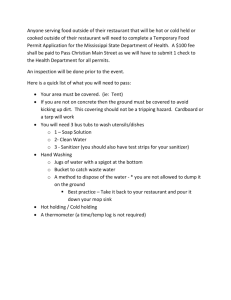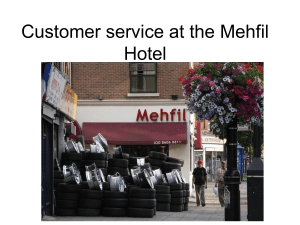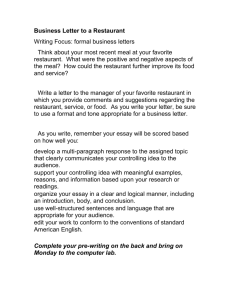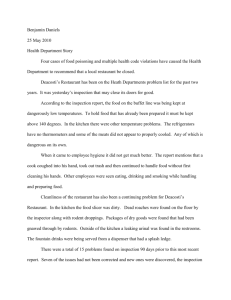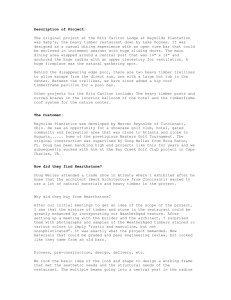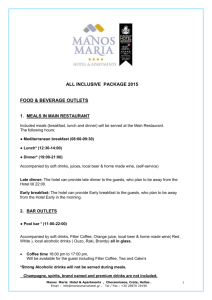View pdf - Capital Hotel
advertisement
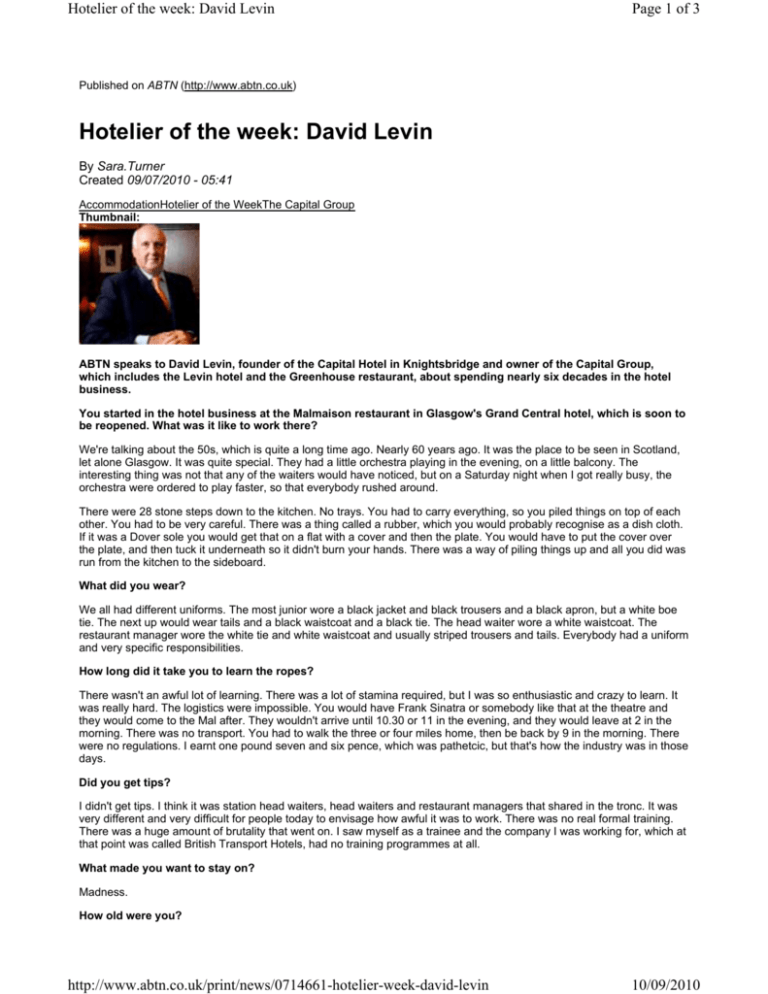
Hotelier of the week: David Levin Page 1 of 3 Published on ABTN (http://www.abtn.co.uk) Hotelier of the week: David Levin By Sara.Turner Created 09/07/2010 - 05:41 AccommodationHotelier of the WeekThe Capital Group Thumbnail: ABTN speaks to David Levin, founder of the Capital Hotel in Knightsbridge and owner of the Capital Group, which includes the Levin hotel and the Greenhouse restaurant, about spending nearly six decades in the hotel business. You started in the hotel business at the Malmaison restaurant in Glasgow's Grand Central hotel, which is soon to be reopened. What was it like to work there? We're talking about the 50s, which is quite a long time ago. Nearly 60 years ago. It was the place to be seen in Scotland, let alone Glasgow. It was quite special. They had a little orchestra playing in the evening, on a little balcony. The interesting thing was not that any of the waiters would have noticed, but on a Saturday night when I got really busy, the orchestra were ordered to play faster, so that everybody rushed around. There were 28 stone steps down to the kitchen. No trays. You had to carry everything, so you piled things on top of each other. You had to be very careful. There was a thing called a rubber, which you would probably recognise as a dish cloth. If it was a Dover sole you would get that on a flat with a cover and then the plate. You would have to put the cover over the plate, and then tuck it underneath so it didn't burn your hands. There was a way of piling things up and all you did was run from the kitchen to the sideboard. What did you wear? We all had different uniforms. The most junior wore a black jacket and black trousers and a black apron, but a white boe tie. The next up would wear tails and a black waistcoat and a black tie. The head waiter wore a white waistcoat. The restaurant manager wore the white tie and white waistcoat and usually striped trousers and tails. Everybody had a uniform and very specific responsibilities. How long did it take you to learn the ropes? There wasn't an awful lot of learning. There was a lot of stamina required, but I was so enthusiastic and crazy to learn. It was really hard. The logistics were impossible. You would have Frank Sinatra or somebody like that at the theatre and they would come to the Mal after. They wouldn't arrive until 10.30 or 11 in the evening, and they would leave at 2 in the morning. There was no transport. You had to walk the three or four miles home, then be back by 9 in the morning. There were no regulations. I earnt one pound seven and six pence, which was pathetcic, but that's how the industry was in those days. Did you get tips? I didn't get tips. I think it was station head waiters, head waiters and restaurant managers that shared in the tronc. It was very different and very difficult for people today to envisage how awful it was to work. There was no real formal training. There was a huge amount of brutality that went on. I saw myself as a trainee and the company I was working for, which at that point was called British Transport Hotels, had no training programmes at all. What made you want to stay on? Madness. How old were you? http://www.abtn.co.uk/print/news/0714661-hotelier-week-david-levin 10/09/2010 Hotelier of the week: David Levin Page 2 of 3 I was 16, from Glasgow, in Pollokshields. I was from a very middle class background, which again was very odd. My Mother and Father were absolutely ashamed of my job and never discussed what I was doing, ever. My Aunt would say to my Mother, "I think we saw David at the Malmaison," and she would say: "No, I don't think so, you're mistaken." She later said, after I had opened the Capital, that both she and my Father had been ashamed of me, and how wrong that was and how right I was. What was your next move? From being a waiter I went into the kitchens, the main kitchens at the Central hotel. It was difficult to do that, as if you were any good the restaurant manager wanted to keep you. Then you had to work your way around the kitchen. In those days kitchens were divided into very specific departments. It was coke stoves, sawdust on the floor so you didn't slip, and it was unbelievably hot. It was a baptism of fire. At that point, I must have been about 18. My Father, who was worried about me, went to see the manager of the hotel. I didn't know about it, and I was sent for. If you were sent for by the head waiter or the head chef you were terrified, but to be sent for by the manager...! He was a wonderful old buy called Etienne Vacher, and told me I would be going to the Scottish hotel school. I didn't want to go, as I was learning so much in the kitchen, but he said I had no choice. When I finished hotel school, I went back to the kitchens. Did those early days give you your passion for food, which is still so evident today? Yes and no. You would think with a passion, you would want to emulate. But what I saw was the worst of the hotel industry. I saw this sadistic kitchen restaurant attitude to each other. They would heat up a silver flat and hand it to a waiter who would have his hand stuck to the thing burnt. In the kitchen, if they didn't like the waiter, they would do a grilled Dover sole, but the under side would be under done and it would be put onto a paper doily - everything used to go on doilies in those sides - and I can tell you that the waiter couldn't get the doily off. It was absolutely stuck. You had to do that in front of the guests. It inspired me to make it right, to do it better. Not to cook the vegetables to death, not to reheat things. I didn't approve of having lamps and hot plates in the restaurant, so when I opened the Capital, the kitchen was open so the chefs could see when Table 3 was being cleared, so they could complete the dish. It was later bricked over, which was a dreadful shame. I might reopen it again one day. You have a new chef who joined in December. What are his plans for the Capital's restaurant? Yes. He's looking to reintriduce gueridon service. A gueridon is a little table on wheels, a French idea. If you came for dinner and ordered Dover sole, and the restaurant manager offered to take it off the bone for you, he would still present the Dover sole to you and then put it on his little table next to you and take it off the bone. That was taken further in my day, because there used to be a lot of cooking done on the gueridon, in a frying pan over a lamp. Scampi cooked in the restaurant, so your hair would stinking of oil. Things like steak Diane... the most popular was crepe Suzette. That was a great luxury. That was done in the room, and flames went up. Now, if you want to do that, I understand that the fire authorities say there should be someone standing by with a fire extinguisher just in case. It kind of ruins the moment. That's how things have changed. There was a lot of theatre that went on that no longer exists. I'm not saying good or bad, I'm just saying different. In the early days, people weren't really interested in food. People were in for a feed. I often say to Chef and our restaurant manager: "Do you understand that 80% of the clients coming in are not hungry." In the early days people used to come in and say they could eat a horse. Nowadays, it's little children who are starving, but adults never are. I think we've been programmed to think it's unhealthy. I started a restaurant called the Greenhouse, with Gary Rhodes, who was originally an apprentice here. We did ox tail, double lamb chops, rice pudding and strawberry jam. Everyone said we were crazy. We were packed out and we got our Michelin star. It was absolutely right. You have to decide on the moment and the moment for me now is much simpler food. This MIchelin star type food, which is overdressed - people are turning against it. The reason I believe is unconsciously people don't think it through. Imagine this plate with something in the middle and peas spaced out around the plate. You must know that those peas have been put on by somebody's fingers. Every pea has been handled. If you go back to your Mother, they never handled food. It just didn't happen. How can you possible handle food, construct food by handling it? It's not right. I believe that people are not aware of it. You mustn't handle food. I'm not saying it's unhygienic, I'm not saying they haven't washed their hands, what I am saying is it's not natural. Vegetables should be heaped on a plate, meat carved and put on a plate, and off you go. The Capital is nearing its 40th year. At the time it was unusual to open a small hotel, together with a high standard restaurant... It was unique to build a 5-bedroom hotel, because that was thought in those days to be a boarding house. Boarding houses had 20 or 30 rooms, therefore I was building a big boarding house, which you couldn't have. I said no, this is a grand hotel in miniature. We had a garage, hall porters, a really lovely restaurant, a valet where you can have your shoes polished and your suit pressed. But people thought 50 rooms wasn't big enough. You have to have a big lobby and all that. http://www.abtn.co.uk/print/news/0714661-hotelier-week-david-levin 10/09/2010 Hotelier of the week: David Levin Page 3 of 3 I find it funny talking about 40 years, because in fact I started in the 1960s and I had to build the hotel. We opened at the beginning of 1971. 40 years ago I was furnishing the hotel and I was designing and having everything made. Things are off the shelf now, but in those days I had to find a taylor to make the uniforms - even the beds were hand made. It was so important to me because I wanted it to be different, it was an individual thing. People thought 50 rooms was impossible, you couldn't make any money out of that, and I knew you could. I was very early 30s, so I knew everything. Now I'm in my 70s, I'm not so sure I know anything. As far as the restaurant was concerned, restaurants in hotels were a complete no no. There were exceptions. There was the Connaught, which was exceptionally good, there was the Savoy, which was dinner dancing, there was the Waldorf, but that again was tea dancing. Nobody went to a hotel to eat. Why? The food was no good. I would tell my colleagues I was going to open a restaurant, and they would ask what i planned to call it. I said I'm not going to call it anything, just the Capital Hotel Restaurant. They said I had to have a name and a separate entrance. They thought people don't like going past a doorman. Rubbish. If you think now, all the hotels have their own restaurants, but the hotels cop out, because they get somebody else to run the restaurant, which I think is ludicrous. I want to run my own restaurant. What do you expect the next decade to hold? What should drive the industry is people's homes. 40 years ago it was a luxury to have your own private bathroom if you stayed in a hotel. Then 20 years ago it was a luxury to have air conditioning. There will be more. There will be much more expense, care, thought and taste going into the decoration of rooms, because you cannot bring people from their home and let them have a room that is lesser than what they have. If you were staying here, I would hope that you would say: "Gosh, isn't this nice. Isn't the soap lovely. That's a super hairdryer." There is a demand for more of that. Also in 2012 the Olympics will make a very big impact on the hotel industry. It's very important that the hotels treat it seriously and look after the people coming for the Olympics from all over the world, and my colleagues seem to be saying they want a huge price. It's very important that we should look after our regulars. I'm very conscious about that. Big improvements will be demanded much quick than everything that has changed in the past. Everything should be about quality. Source URL: http://www.abtn.co.uk/news/0714661-hotelier-week-david-levin http://www.abtn.co.uk/print/news/0714661-hotelier-week-david-levin 10/09/2010
